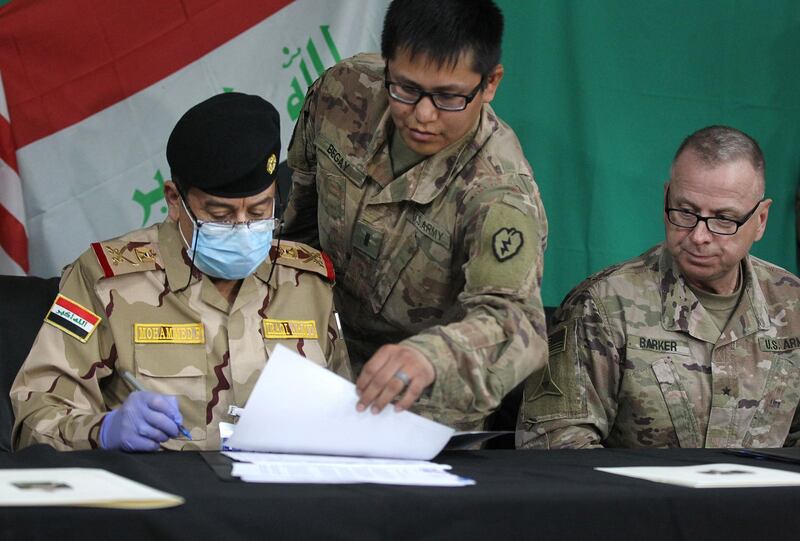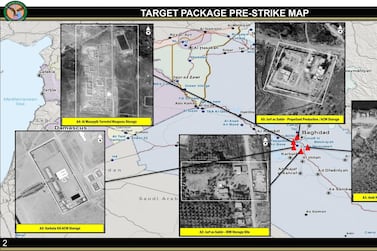US forces have handed over the international section of a base in the Iraqi oil centre of Kirkuk, the third installation they have given back to the Iraqi army this month, as it reduces its military presence in the country to key locations.
The US-led coalition against ISIS said it completed the handover of the K1 Base in Kirkuk Province to the Iraqi army on Sunday.
Since early March, the US has handed over the international sections of Al Qaim base near the Syrian border and Qayyarah base in Nineveh governorate, near the city of Mosul.
Troops at Qayyarah came under fire in November when 17 rockets were launched by pro-Iranian militia in Iraq.
"K1 has served as a critical location for the Coalition, Iraqi security forces and counter-terrorism service in the fight to find and destroy ISIS safe havens," US Brig Gen Vincent Barker said.
A US State Department official told The National that American forces are not withdrawing from Iraq. "The US is not withdrawing from Iraq. We are committed to a partnership and friendship with Iraq," he said. Commenting on the redeployments, the US official reiterated that "these re-deployments were pre-planned and based on the success that we and our partners have had against ISIS."
Areas south of Kirkuk, and north of neighbouring provinces of Diyala, Salahaddin and Nineveh remain centres for ISIS activity.
The stretch of territory is disputed between the Iraqi government and the autonomous Kurdish region, which has created security gaps benefiting ISIS militants.
The coalition had at times been a mediator between the two competing authorities.
A senior coalition official this month claimed ISIS forces were not as able to exploit the “security gap” between Iraqi and Kurdish forces as they did in the past.
“That doesn’t necessarily mean that Daesh is free to operate in the way that they wish,” the official said. “They’re still pretty constrained.”
The move comes after months of rising tension since the assassination of Iranian general Qassem Suleimani in a US drone strike in Baghdad.
US military bases have been hit by more than two dozen rocket strikes since October 2019.
The attacks, which the US has partly blamed on Kataib Hezbollah, an Iran-backed group in the Hashed Al Shaabi military network, have prompted fears of a proxy war on Iraqi soil.
The coalition said on Sunday that the decision to reposition troops was "long-planned" and "not related to recent attacks against Iraqi bases hosting coalition troops, or the Covid-19 situation in Iraq".
The coalition “will relocate and consolidate personnel and equipment from several Iraqi bases throughout 2020", it said.
The repositioning is in line with plans to pull out from bases across Iraq and consolidate coalition forces in Baghdad and at Ain Al Asad Air Base in the country’s western desert.
The plan has been in the works since late last year, the senior coalition military official said.
It accelerated when Iraqi forces proved they were capable of facing ISIS with limited coalition assistance.
About 7,500 foreign troops are in Iraq as part of the US-led coalition helping local troops to fight the remaining militants, but those numbers are being significantly reduced this month.
Iraq announced the defeat of ISIS in late 2017, and the coalition is now implementing plans developed last year to consolidate its troop presence across the country.







